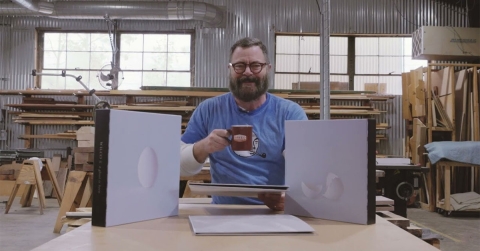Congratulations to composer Thomas Adès, who has been awarded the Premio Fronteras del Conocimiento (Frontiers of Knowledge Award) in Music and Opera by the Fundación BBVA in Spain for "the extraordinary international reach of his work, which makes him one of the most acclaimed musicians of our time." The award, which includes 400,000 euros in each of its eight categories, aims to celebrate and promote the value of knowledge as a public good without borders. The premiere recording of Adès's Dante, performed by LA Phil and Gustavo Dudamel, is due April 21.
Congratulations to composer Thomas Adès, who has been awarded the Premio Fronteras del Conocimiento (Frontiers of Knowledge Award) in Music and Opera by the Fundación BBVA in Spain for "the extraordinary international reach of his work, which makes him one of the most acclaimed musicians of our time.” The jury highlights “the communicative capacity of his music, which connects transversally with diverse audiences while opening horizons for the future" through an "extensive catalog of compositions that covers all genres: symphonic, piano, chamber music, ballet, and opera.”
One of the keys to his connection with the audience is, according to Victor García de Gomar, secretary of the jury and artistic director of the Gran Teatre del Liceu, “his ability to combine contemporary compositional techniques with resources to restore emotion and expressiveness from the stage to the room. He manages to restore music to its most natural space, which is the ear, creating a perfect harmony between the ear and the mind. This is what makes his music enormously modern, through a language that connects with affections, linking the rational with the emotional. Creating music that needs to be expressed, not just performed.”
Adès told the Foundation: “Emotion is a supreme dimension for every artist. I believe that the rational mind must be transcended to build something new. Of course rationality is always present and is part of the process, but the truth is that I cannot separate emotion from reason. When I am working I do it mainly through my instinct, a kind of survival to try to get from one point to the next. If, on occasions, I balance between ideas or rational processes with that instinct, perhaps it is something that is observed more from the outside. I am excited that this is how it is perceived by the public; It is recognition that encourages and inspires me.”
Nonesuch releases the premiered recording of Adès’ Dante—a ballet score in three acts based on Dante Alighieri’s La Divina Commedia—recorded by the Los Angeles Philharmonic and its Music & Artistic Director Gustavo Dudamel in concert at Disney Hall, on April 21. “The three parts of Dante,” he says, “are completely different musical worlds. Liszt is my guide to hell, in one part of the music I am like a Liszt ventriloquist, while in another part the music is mine … Paradiso it's my own pure geometry, a geometry out of time that I wanted to build … When you read Dante, he's timeless, he doesn't seem like 14th century poetry but he sounds both modern and ancient, he writes something that is not from any particular era, in a page is Aristotle and on the next page are contemporary figures, you have the feeling of being out of time. This is what I wanted to convey with the music, that you can fall into that world from any era, and feel like you are always in the present moment."
Thomas Adès was nominated for the Premio Fronteras del Conocimiento by Franz Welser-Möst, Music Director of the Cleveland Orchestra, and Sam Wigglesworth, Performance Music Director of Faber Music.
The Fundación BBVA’s Premio Fronteras del Conocimiento, endowed with 400,000 euros in each of its eight categories, recognize and encourage contributions of singular impact in the physical sciences and chemistry, mathematics, biology and biomedicine, technology, the environment (climate change, ecology, and conservation biology), economics, social sciences, humanities, and music, especially those that significantly expand the scope of what is known in a discipline, give rise to new fields, or build bridges between various disciplinary areas. The objective of the awards, since their creation in 2008, is to celebrate and promote the value of knowledge as a public good without borders.
- Log in to post comments



